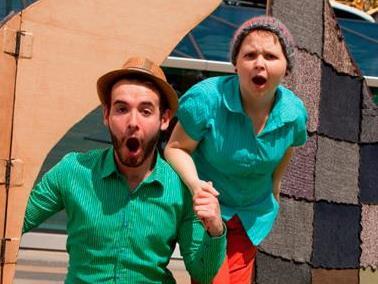Image: International Inclusive Arts Network (IIAN)
Is there a world-wide movement towards access and inclusion in theatre? That’s what it looks like to me, after attending the 18th ASSITEJ (International Association of Theatre for Children and Young People) world congress and Korczak festival in Warsaw, Poland.
As Access Officer at St Martins Youth Arts Centre in Melbourne my business is broadening inclusivity: making our theatre programs and audiences accessible for children and young people who; have a disability, are from a culturally diverse background or who experience social, economic or educational disadvantage. We proactively seek and include these kids in the opportunities St Martins offers.
St Martins had applied to go to Warsaw to showcase two projects; one was our Soundtracks project and the other was to run our Inclusive Theatre Practice workshop at the Warsaw Instytut Teatralny (Theatre Institute). Along with Alex Walker, one of the Associate Directors at St Martins, I attended several international shows for young audiences and seminars and workshops.
Daryl Beeton, Artistic Director of Kazzum Theatre in London, presented an engaging presentation about his life as a disabled artist, as well as a workshop offering some great inclusive exercises that clearly had the international participants thinking differently when they left the room.
He observed that his predecessors (artists with disabilities) were very hardline and highly political and they had to be to promote equality. But now a new generation of inclusive theatre practitioners is coming through, people who are connected by the desire to develop inclusive theatre and inclusive theatre audiences.
The change rang bells for me. Turn the clock back fourteen years: My artistic collaborator and partner Andrew Tranter and I are sitting in the office of The London Disability Arts Forum. The conversation is going swimmingly about the work the LDAF is doing and the work we do in Melbourne. Then, one of the artists we meet asks; “So, what disability have you got?” Andrew and I don’t identify as having a disability. We squirm. ‘Um, we don’t have a disability, we just, um, like inclusive theatre and art.’ Awkwardly, the conversation was wrapped up quickly.
I understand that people who are marginalized require separatism to create identity an to harness an important movement like disability awareness. I am cognisant and supportive of the; “not about us without us” sentiment. Yet, still, I felt sad that we couldn’t share the great stuff we were developing in Australia, because, although we worked inclusively, making hybrid visual art and performance works with artists with intellectual disabilities, we were not disabled people ourselves.
Disability is always a knife-edge away. Indeed, since then, I have acquired my own (according to the legal definition of disability at least). Ironically, this at a time when it appears there is a powerful movement rising from the arts sector about creating inclusion. This is a space where disabled artists and non-disabled artists can come together as inclusive theatre makers to generate inclusive audiences.
The other light-bulb moment that I experienced in Warsaw, was IIAN. IIAN stands for International Inclusive Arts Network. It’s an organisation in its infancy, dedicated to inspiring artists to be more ambitious and become a part of>the inclusive arts community, promoting inclusive arts and international connections, sharing good practice and providing a data base of companies working inclusively around the globe. Check them out at www.inclusiveartsnetwork.com
Before we headed to ASSITEJ, my sense was that we were bringing something fairly unique. I had expected to be an anomaly. What I hadn’t expected was to find a community of people, who not only perceived the theatre world in a similar way to me and St Martins, but who had organised themselves into becoming a global force to address inequities in the international theatre sector.
IIAN has managed to formalise a partnership with ASSITEJ in order to develop the inclusivity of the festival as well as to operate as a resource for anyone wanting to work inclusively. It was a blast to meet Daryl who chairs IIAN, Talleri McRae from Stage One Family Theatre, Louisville, Kentucky, USA, Vicky Ireland from the UK and to hear from Boris Carksiran from Serbia and Laura from Berlin’s Ramba Zamba.
I’m happy to say I’ve been asked to become a core member of the organisation. So I urge all inclusive theatre practitioners – and not yet inclusive theatre practitioners -alike, to check out ILAN and email me. I will be hosting an IIAN event in upcoming months at St Martins Youth Arts Centre and I would love to welcome you.




